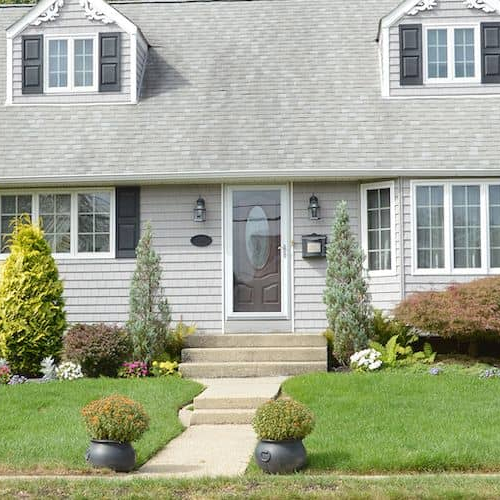How to save for a house: A complete guide
Contributed by Sarah Henseler
Dec 28, 2025
•8-minute read

If you have your sights on buying a home, you might find yourself fretting over all the costs that come with homeownership – and maybe you’re not quite sure where to start.
Not to worry. It's entirely understandable that you might be concerned over the larger costs, such as the down payment, closing fees, taxes, and insurance. The thing is, saving for a house is entirely within your reach. You'll need to know how much to shore away saving for a house and find smart strategies to save.
What costs are associated with buying a house?
Let's take a close look at common costs that come with homeownership:
Down payment
A down payment is the money you put toward the purchase of a house that you're financing with the help of a lender. Down payments vary by mortgage type and usually range anywhere from 0% to 20% of the home price. If you put down at least 20%, you'll be able to avoid conventional private mortgage insurance (PMI).
Here are the required minimum down payment amounts for popular mortgage programs and home loan types:
| Mortgage program | Typical minimum down payment |
|---|---|
| Conventional | 3% |
| Jumbo | 10%, in some cases up to 30% |
| VA | 0% |
| FHA | 3.5% |
| USDA | 0% |
*Currently, USDA loans aren’t available through Rocket Mortgage®.
To figure out how much cash you'll need to gather to buy a home you can call you own, you can use the Rocket Mortgage down payment calculator.
Closing costs
Also known as settlement fees, closing costs are expenses you'll need to pay before a home is officially yours. These are charged by third parties such as your lender and real estate agent, and can include costs that have to do with property expenses, the application process, and other paperwork.
These closing costs usually are between 3% to 6% of the loan amount, and can vary based on factors like the lender, loan type, and location. These costs can be negotiable, and they can sometimes be rolled into the loan. Closing costs impacts how much you need to save in order to afford the purchase of your home.
Other expenses
You'll likely rack up expenses beyond the major ones we just talked about, such as:
- Moving expenses: $881 – $2,564
- Storage costs: $100 – $450
- Repair and maintenance costs: 1% – 4% of your home's value
- Furnishings and appliances: $6,400 for a small studio to $44,000 for a larger home
The exact cost depends on a handful of details, such as the size of your home, how much you already have, and the value of your home. And if you're moving across the country, moving expenses will be greater than relocating across town.
How much should I save for a house?
The exact amount you should shore away to buy a house varies, and is based on your budget, preferences, goals, and lifestyle. You can use the Rocket Mortgage affordability calculator so you know how much house you can afford. It can help you estimate specific costs in your situation.
For example, let's say you put 20% down on a $440,000 house ($88,000), and you pay closing costs of 4% of the $352,000 necessary loan amount, which is $14,000. Then, you anticipate spending $3,000 on moving and other expenses. In this case, the minimum target savings goal would be $105,000.
It can be a good idea to have a bigger savings cushion in case unexpected costs that pop up. In that case, you'll want to best determine a target amount and save for that.
9 strategies to save up for a house more quickly
Here are some ways you accelerate saving up for a house:
1. Build a better budget
The first step in the saving process is budgeting for your house. If you don’t know where your money goes every month, it’s impossible to divert money to your down payment. Follow these steps to help put a budget in place:
- Calculate your monthly take-home pay: Know how much money you’re bringing home each month, including your income and any income that your spouse will be contributing. Then, sit down with your bank and credit card statements to determine where you’re spending the most money.
- Factor in recurring payments: Calculate your monthly expenses, including necessities like rent, student loan payments, groceries, and utilities. Next, consider how much you spend each month on nonessentials like entertainment, restaurants, etc. A budgeting app like Rocket Money can help you automate this process if you’d like to avoid calculating your expenses yourself.
- Refine your budgeted amounts: Set a definite – yet realistic – budget for each category and stick to it. Make sure you budget a certain dollar amount to put away for your down payment each month. Consider your savings a non-optional expense.
2. Reduce unnecessary expenses
- Consider downsizing. This can help you save on all-around costs. Think about moving into a smaller home, or from a two-car household to a single-car one.
- Cancel unnecessary services. Pore through your fitness memberships and monthly streaming subscriptions to see which ones you can drop.
- Avoid impulse purchases. Consider a 30-day list, where you jot things down you want to buy, and wait 30 days to see if you still want them. Or, don't shop when you're hungry and create a list before stepping foot inside a store. You can also commit to a no-spend challenge.
- Cut back on eating out. Consider batching cooking more frequently, or go out to eat several times a month versus once a week.
- Choose a staycation over expensive vacations. Sometimes you need a break from your routine to give you the respite you need.
3. Ask for a raise or promotion
If you have little money left over to save after you get paid, it might be time to ask for a raise or promotion, or seek opportunities to be involved with a new job project and work overtime.
Browse job posting sites and salary comparison websites to see if you earn as much money as people who work in similar roles. If you discover your salary is below average, consider using your findings as leverage.
The best time to ask is during your annual performance review or after delivering a big win. Your attitude during your salary discussion meeting is just as important as what you say. Be confident in what you’re asking, but also be grateful and enthusiastic.
4. Pick up a side hustle
Thanks to the gig economy, it’s easier than ever to earn money on your own time with a side hustle. If your schedule allows for a little extra work, here are a few ideas you can use to get started:
- Pick up some freelance work
- Drive for a ride-sharing company
- Deliver groceries or restaurant meals
- Offering tutoring services
- Pet-sit or walk dogs
- Test apps and websites
- Be a personal shopper
5. Rent out your spare room, car, or parking space
Do you have an extra bedroom in your apartment? Or maybe your is car collecting dust since you’ve transitioned to remote work? If so, consider listing them on rental marketplaces like Airbnb and Turo. That way, you can leverage your assets to receive a consistent monthly payment.
You'll want to be aware that rules and regulations for house hacking, or renting out property, differ depending on where you live. Plus, you might live in an area with significant restrictions.
Both platforms let you approve dates and guests ahead of time and only rent out your car or spare room when it’s convenient. You can even block out dates when your rental isn’t available, or when you know you'll need your car.
If you live in an urban area where parking is at a premium, consider renting out any of your assigned parking with an app like JustPark. JustPark lets you rent out your parking space just like you’d rent out your spare room on Airbnb.
If you live in a tourist destination or heavily populated area, these sources of extra cash can make a huge difference in how much money you can save for your house each month.
6. Save any windfalls
Commit to saving at least a portion of any windfalls that come your way. That way, it can speed up your home savings goals.
Consider tucking away part of your:
- Work bonuses
- Holiday gifts
- Birthday or special occasion gifts
- Tax refunds
- Insurance payouts
- Inheritances
- Lottery or prize winnings
7. Chop down your debt
If you’re on a mission to buy a home, diverting your extra income toward your debt might seem counterintuitive. However, one of the first things lenders look for when they consider you as a mortgage candidate is your debt-to-income ratio (DTI).
The typical debt-to-income ratio to get approved for a mortgage is usually 28% on the front end, which is your housing debt; and 48% on the back end, which is your monthly housing payment plus all your other debt.
A higher DTI ratio can impact your ability to qualify for a mortgage in the first place and may influence the interest rate and amount that your lender will be willing to offer. This can mean that you’ll pay more in interest and have a higher down payment requirement.
Take some time to reduce your debt before you apply for a mortgage loan. You can try a popular debt method such as the debt snowball or debt avalanche method. Or, you can take out a debt consolidation loan for your high-interest credit card debt. Look at exactly how much you owe on your credit cards, student loans, personal loans, and auto loans, and create a plan to tackle it.
8. Automate your savings
If you’re the type of person who’s prone to impulse shopping, you may want to consider automating your savings.
After deciding how much you want to tuck away per month, contact your bank and authorize an automatic withdrawal from your primary account into a separate savings account. Your bank will automatically take money out of your account each month and stash it away in a separate account.
This approach can be useful if you tend to have trouble with keeping your savings top of mind. When you make your money less accessible, you may be less tempted to buy things you don’t need. Just remember to schedule your withdrawal on your payday or when you know you’ll have enough money. Those overdraft fees can put a serious dent in your down payment fund.
9. Seek help with your home savings
You can do your homework and look into first-time home buyer assistance programs in your area, which often offer down payment/closing cost grants or loans.
You can also consider asking relatives and friends for gift funds to put toward your down payment. However, it's important to know the rules that mortgage programs have regarding gifts and gift letters for your mortgage.
The bottom line: Saving for a house is within reach with the right strategies
Saving for a house can feel like quite a feat, and it may likely be one of the largest – if not the largest – purchases you'll ever make.
If it's your first foray into homeownership, carefully consider all the costs that come with buying a home, determine a target savings amount, and mind the tips to speed up the process. And when you're ready to buy, you can apply for a mortgage.

Jackie Lam
Jackie Lam is a seasoned freelance writer who writes about personal finance, money and relationships, renewable energy and small business. She is also an AFC® financial coach and educator who helps creative freelancers and artists overcome mental blocks and develop a healthy relationship with their finances. You can find Jackie in water aerobics class, biking, drumming and organizing her massive sticker collection.
Related resources
5-minute read
Down payment assistance programs and grants: What they are and how they work
Need help buying a home? Explore the different types of down payment assistance programs and grants available to you today.
Read more
7-minute read
What is cash to close?
In order to close on your house, you will need to bring cash to close the mortgage deal. Learn what expenses are included in your cash-to-close amount and mo...
Read more

8-minute read
How to buy a house with no money down
Some mortgages allow you to buy a house with no money down. Learn how to buy a house with n...
Read more